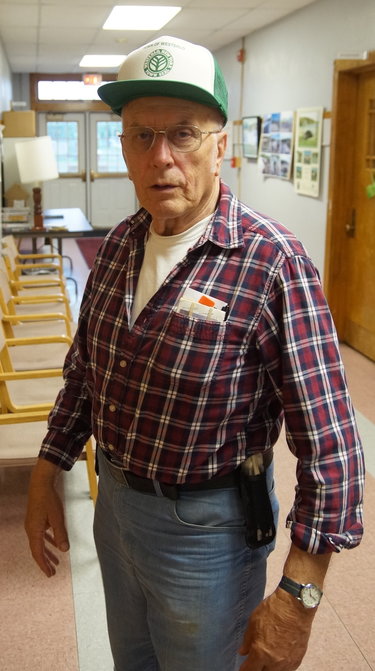Richard Rapp, Westerlo supervisor who ‘took care of the people,’ mourned
WESTERLO — Richard H. Rapp, who worked for Westerlo for more than half a century — serving as supervisor for 41 years — died on Monday, Sept. 1, 2025.
Mr. Rapp oversaw the modernization of a town that, when he started working for Westerlo, had mostly dirt roads, no highway garage, no town hall, no library, no public water system, no town park, and no museum.
After he resigned in 2019, the town hall was named after him.
“He would seek people out who had problems and issues within the town to help wherever he could,” said William Bichteman who served as deputy supervisor under Mr. Rapp and became supervisor himself after Mr. Rapp stepped down.
“There’s a business side and a compassionate side,” he said of Mr. Rapp, describing him as devoted to his wife, Patricia, and their daughters, Debora and Susan. “Board meetings and things like that were all business.”
[Read the obituary and service information.]
Robert Snyder, a farmer who served as a Democratic Westerlo town councilman for 48 years, described Mr. Rapp at the time he retired as an ordinary man who had lived his whole life in Westerlo and was known to everyone. He recalled campaigning with Mr. Rapp years ago, going door-to-door to talk to residents.
“We listened to the people, what they wanted; some places nobody had ever been to,” said Snyder. “So we wrote down what they thought they would like; they’d come back and thank us ….”
Mr. Rapp worked as the town assessor for 10 years before he ran unopposed in 1977 to succeed Supervisor Edwin Haverly. In 1991, he was named the chairman of the town’s Democratic Committee.
From 1988 until 2000, Mr. Rapp worked a full-time job as commissioner of Albany County’s public works department while simultaneously working part-time as Westerlo’s supervisor.
Mr. Rapp’s time as supervisor wasn’t without controversy but he rode out turbulence with calm. When he was indicted for perjury in 1991, he still had unanimous backing from the town’s Democratic committee to run for supervisor.
“When I was campaigning once, this man told me, he says ‘We know what we got, and we don’t know what we’d get if we run somebody else,’” noted Mr. Snyder, while talking about Mr. Rapp’s campaigning.
Mr. Rapp resisted the expertise of appointed planning board members. He led the town board in disbanding Westerlo’s planning board in 1992 after developers complained about the length of time and requirements to get approval for projects. For 15 years, until residents sued the town, the town board served as the planning board as well.
Mr. Rapp stubbornly declined to have the town undergo property revaluation despite being in violation of state standards for decades.
Mr. Snyder said that Mr. Rapp’s stance — Westerlo last underwent a revaluation in the 1950s — kept the taxes low for long-time residents, one of the reasons people continued to vote for the supervisor, he said.
Mr. Snyder also said that, when he started on the town board, most of Westerlo’s roads were dirt and Mr. Rapp, with his background in roadwork, got many of them paved.
Mr. Rapp oversaw buying the Westerlo school building to be used as the town hall. The town had been sharing a building with its highway garage until 2010. The plan had been controversial and a public referendum was forced, passing by a vote of 374 to 262.
“With all the scuttlebutt going around, I figured it would be closer,” said Mr. Rapp the night the votes were counted, “not that I’m complaining.”
He also oversaw the establishment of the first municipal water system in Westerlo, of the town park, and of the library.
In 1986, Westerlo established its library in the donated building that had once served as the town’s general store. The town museum was placed in the back of the library before a building on Route 1 was bought in 1995. The museum was officially opened 20 years after the building was purchased, as part of the town’s bicentennial celebration in 2015.
Westerlo’s bicentennial celebration included a play, parade, dance, picnic, and a 5K race. The history celebrated ranged from a play reenacting the Anti-Rent Wars, to items on display from the 19th and 20th centuries, as well as a connection with the town’s sister city of Westerlo, in Belgium, going back to the 1980s.
The connection with Belgium began during World War II, said Mr. Snyder, when his brother, George Snyder, was stationed there.
At the town’s bicentennial, the mayor of Westerlo in Belgium and his wife visited the town. Mr. Rapp was grand marshal of the parade. He and his wife rode in the parade with the Belgian mayor and his wife.
Throughout most of his tenure, Mr. Rapp led the town board meetings with little opposition. Meetings were so short that, if someone arrived 10 minutes late, the meeting could be over. The board votes, following little or no discussion, were nearly always unanimous.
“Things were different back then, you know,” said Mr. Bichteman, noting there were two Democrats for every Republican in Westerlo.
“It wasn’t so bipartisan. There really weren’t too many political adversaries for Dick. He was a Democrat in a Democratic town and he had success because he took care of the people over here and did his job to his fullest.
“And so he really had no trouble being re-elected. Once in a great while, they would run people against him, but he would win by wide margins.”
He concluded of Mr. Rapp, “He was a man of principle … Whenever there was something controversial, he dealt with it straight up.”



